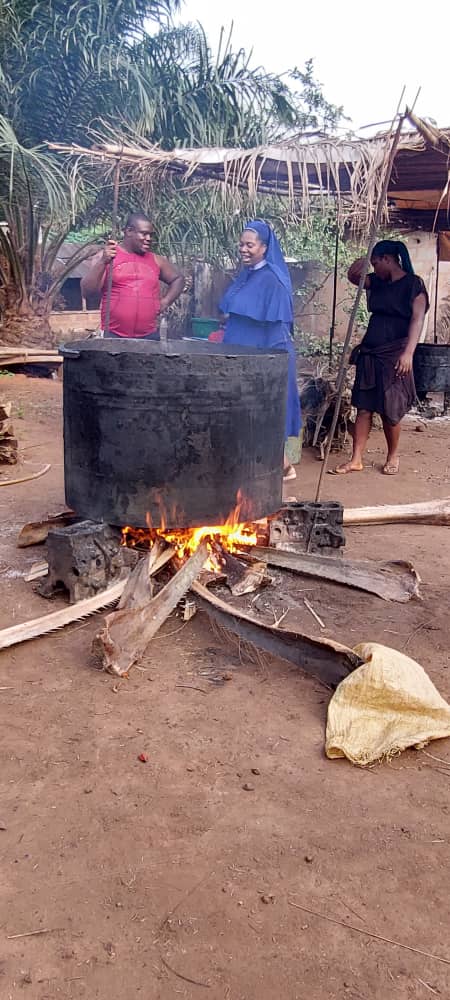The production of palm oil in Nigeria – focus on knowledge and production
In West African cuisine, palm oil is the common cooking oil. But also in industrialised countries, palm oil is an important ingredient in many products we use every day, from food to cosmetics. Nigeria is one of the largest producers of palm oil in the world, using both traditional and modern methods of production.
This article explores the history of palm oil production in Nigeria and explains the differences between traditional and modern production methods.
Traditional palm oil production in Nigeria: manual labour and challenges
In Nigeria, away from large-scale mass production, palm oil is still produced by smallholder farmers using traditional manual labour.
The fruits are separated from the palm fronds with a knife or machete. Then the palm fruits are cleaned, boiled, and finally pressed through a cloth to extract the oil from the fibres. The oil is collected and put into containers for further processing. This traditional production process is very labour intensive and requires great strength.
In some villages, small cooperatives have formed in recent decades that have acquired processing equipment. However, even this option involves a slow and arduous process of palm oil extraction and cannot compete with the modern methods and equipment used by large companies. The limited resources and low capacity of the processing facilities also result in lower yields and affect the efficiency of production. Mostly, this type of production is reserved for subsistence or a small sideline.
However, the traditional method of palm oil extraction ensures a higher quality of the end product and does not rely on chemicals and heavy machinery. It is sustainable and effective and should definitely be supported!
Overall, traditional palm oil production in Nigeria still plays an important role in the local economy and provides a small side income for many smallholder farmers.



Modern palm oil production in Nigeria: efficiency and environmental impact
In Nigeria, palm oil is produced using both traditional and modern methods. Larger companies often use modern methods to increase the efficiency and quantity of production. However, these methods have negative impacts on the environment and the local population.
Modern production methods involve the use of heavy machinery and chemical fertilisers to improve the harvest and increase the yield. Palm trees are mostly grown in large plantations, which leads to the deforestation of rainforests and destroys important habitats for wildlife. The use of chemicals leads to soil and water pollution, and the negative effects on the environment and the health of the local population are obvious.
The benefits of modern methods are increased production efficiency, higher yields, jobs and income opportunities for the local population. To reduce negative environmental impacts and put production on a sustainable basis, some companies have started using sustainable methods. It is important that modern methods of palm oil production in Nigeria are critically examined and that measures are taken by companies and governments to reduce the negative impact on the environment and guarantee the protection of the local population.
The impact of palm oil on the land in Nigeria and why conscious consumption is important
Conscious purchasing, paying attention to products from sustainable production, and giving preference to fair trade products are important.
Why? Smallholder farmers are supported and receive a fair wage for their work. Consumers should be aware that the manual production of palm oil is beneficial for the environment and the local population, while modern production methods cause the problems mentioned above. What is our contribution as consumers?
To consider alternatives to palm oil such as rapeseed or coconut oil to reduce the negative impact of palm oil on the environment and the local population.
